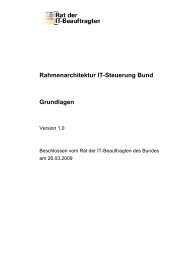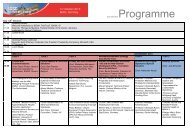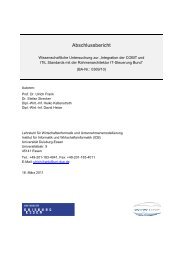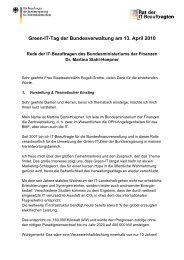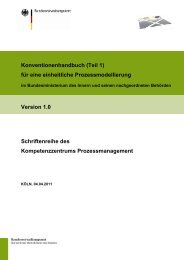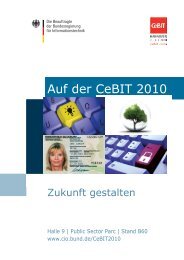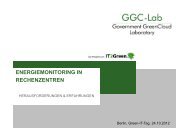Rechtliche Aspekte der Nutzung, Verbreitung und ... - Bund.de
Rechtliche Aspekte der Nutzung, Verbreitung und ... - Bund.de
Rechtliche Aspekte der Nutzung, Verbreitung und ... - Bund.de
Sie wollen auch ein ePaper? Erhöhen Sie die Reichweite Ihrer Titel.
YUMPU macht aus Druck-PDFs automatisch weboptimierte ePaper, die Google liebt.
72 6 Anhang: Texte <strong><strong>de</strong>r</strong> wichtigsten OSS-Lizenzen<br />
To protect your rights, we need to prevent others from <strong>de</strong>nying you these rights or asking you to surren<strong><strong>de</strong>r</strong><br />
the rights. Therefore, you have certain responsibilities if you distribute copies of the software, or if you modify<br />
it: responsibilities to respect the freedom of others.<br />
For example, if you distribute copies of such a program, whether gratis or for a fee, you must pass on to the<br />
recipients the same freedoms that you received. You must make sure that they, too, receive or can get the<br />
source co<strong>de</strong>. And you must show them these terms so they know their rights.<br />
Developers that use the GNU GPL protect your rights with two steps: (1) assert copyright on the software,<br />
and (2) offer you this License giving you legal permission to copy, distribute and/or modify it.<br />
For the <strong>de</strong>velopers' and authors' protection, the GPL clearly explains that there is no warranty for this free<br />
software. For both users' and authors' sake, the GPL requires that modified versions be marked as changed,<br />
so that their problems will not be attributed erroneously to authors of previous versions.<br />
Some <strong>de</strong>vices are <strong>de</strong>signed to <strong>de</strong>ny users access to install or run modified versions of the software insi<strong>de</strong><br />
them, although the manufacturer can do so. This is f<strong>und</strong>amentally incompatible with the aim of protecting<br />
users' freedom to change the software. The systematic pattern of such abuse occurs in the area of products<br />
for individuals to use, which is precisely where it is most unacceptable. Therefore, we have <strong>de</strong>signed this<br />
version of the GPL to prohibit the practice for those products. If such problems arise substantially in other do -<br />
mains, we stand ready to extend this provision to those domains in future versions of the GPL, as nee<strong>de</strong>d to<br />
protect the freedom of users.<br />
Finally, every program is threatened constantly by software patents. States should not allow patents to restrict<br />
<strong>de</strong>velopment and use of software on general-purpose computers, but in those that do, we wish to avoid<br />
the special danger that patents applied to a free program could make it effectively proprietary. To prevent<br />
this, the GPL assures that patents cannot be used to ren<strong><strong>de</strong>r</strong> the program non-free.<br />
The precise terms and conditions for copying, distribution and modification follow.<br />
TERMS AND CONDITIONS<br />
0. Definitions.<br />
“This License” refers to version 3 of the GNU General Public License.<br />
“Copyright” also means copyright-like laws that apply to other kinds of works, such as semiconductor masks.<br />
“The Program” refers to any copyrightable work licensed un<strong><strong>de</strong>r</strong> this License. Each licensee is addressed as<br />
“you”. “Licensees” and “recipients” may be individuals or organizations.<br />
To “modify” a work means to copy from or adapt all or part of the work in a fashion requiring copyright per -<br />
mission, other than the making of an exact copy. The resulting work is called a “modified version” of the earli -<br />
er work or a work “based on” the earlier work.<br />
A “covered work” means either the unmodified Program or a work based on the Program.<br />
To “propagate” a work means to do anything with it that, without permission, would make you directly or sec -<br />
ondarily liable for infringement un<strong><strong>de</strong>r</strong> applicable copyright law, except executing it on a computer or modifying<br />
a private copy. Propagation inclu<strong>de</strong>s copying, distribution (with or without modification), making available<br />
to the public, and in some countries other activities as well.<br />
To “convey” a work means any kind of propagation that enables other parties to make or receive copies.<br />
Mere interaction with a user through a computer network, with no transfer of a copy, is not conveying.<br />
An interactive user interface displays “Appropriate Legal Notices” to the extent that it inclu<strong>de</strong>s a convenient<br />
and prominently visible feature that (1) displays an appropriate copyright notice, and (2) tells the user that<br />
there is no warranty for the work (except to the extent that warranties are provi<strong>de</strong>d), that licensees may con -<br />
vey the work un<strong><strong>de</strong>r</strong> this License, and how to view a copy of this License. If the interface presents a list of<br />
user commands or options, such as a menu, a prominent item in the list meets this criterion.<br />
1. Source Co<strong>de</strong>.




